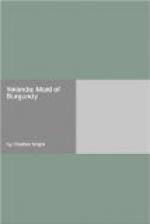Well might King Louis wonder. Charles also wondered, and cursed the stupidity of the Bishop of Cambrai, who had so “encumbered his letter with senseless courtesy as to distort its meaning.”
Charles despatched letters to Peronne and Ghent, ordering immediate preparations for the marriage. As usual, poor Mary was not considered of sufficient importance to receive notice of the event that concerned her so vitally. Others would prepare her, as one might fatten a lamb for slaughter. The lamb need not be consulted or even informed; the day of its fate would be sufficient for it. I was in despair. Max, in his ignorance, was indifferent.
After a short delay, the duke gathered his wrath and his army and laid siege to the town of Morat, announcing his intention to give no quarter, but to kill all, old and young, men, women, and children. The Swiss were prepared for us. “The energy of pride was going to be pitted against the energy of patriotism.” Again disaster fell upon Charles. Thousands of his army were slain, and thousands fled in hopeless rout. His soldiers had never wanted to fight, and one man defending his hearth is stronger than half a score attacking it.
The loss of this battle drove Charles back to Burgundy. With a few of his train, including Max and myself, he retired to the Castle of La Riviera. Here he learned that Rene, Duke of Lorraine, had mustered his forces and had laid siege to Nancy, which city Charles had taken from Duke Rene, some years before, and had garrisoned with Burgundians and English. Upon hearing this unwelcome news, Charles began the arduous task of collecting another army. He was compelled to leave the neighborhood of Switzerland and fly to the rescue of Nancy.
The first of January found us before Nancy, but our arrival was three days too late. The city had capitulated to Duke Rene. On the fifth of January a battle was fought before Nancy, but Fortune had turned her back for all and all on this cruel Duke of Burgundy and Count of Charolois. The disasters at Granson and Morat were repeated. At nightfall Charles could not be found. I supposed that he had escaped, but the next morning his body was found by a washerwoman, frozen in the ice of a pond. He had been killed through the machinations of Campo-Basso. Duke Rene magnanimously gave Charles regal burial, and dismissed his followers without ransom. You may be sure I was eager to return to Peronne.
Fortune, in turning her back upon Charles, had turned her smiling face toward Max. Her ladyship’s smiles were too precious to be wasted, so we made post-haste for Peronne, I spurred by one motive, Mary of Burgundy, Max by another—Yolanda. His heart had grieved for her in castle, in camp, and in din of battle. He had, unknown to me, formed a great and noble resolution; and there was no horse swift enough to keep pace with his desire when we started for Peronne.
I was the first to announce the duke’s death. The dark news was given by me to the duchess and the princess in Margaret’s parlor. These poor women tried to grieve, but they were not hypocrites, and they could not weep. Each had received at Charles’s hands only ill-usage and cruelty, and in their hearts they must have felt relief at his death.




